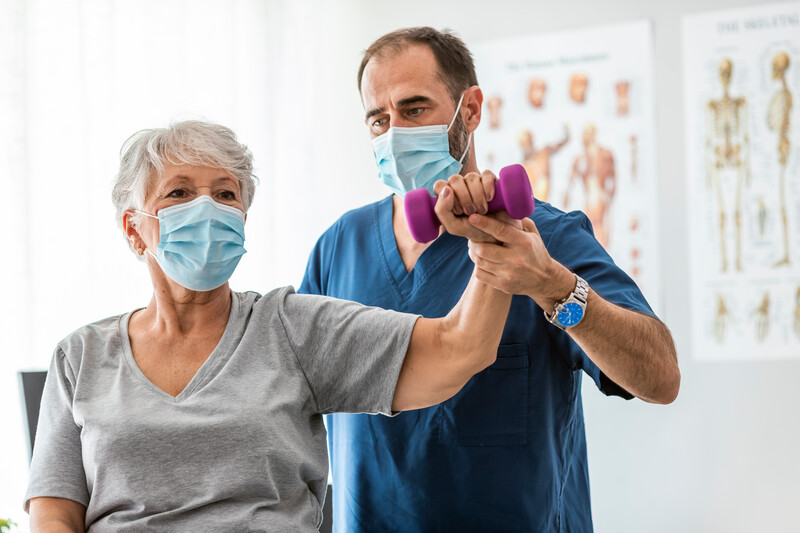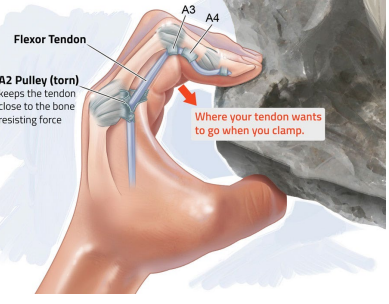Treating Conditions of the Hand, Wrist, Elbow and Shoulder
Hand therapy at The George Washington University Hospital addresses injuries and conditions of the hand, wrist, elbow and shoulder. Treatment often begins within days of an injury or surgery and continues until the patient is able to return to work and a productive lifestyle.
Contact the outpatient rehabilitation center
To contact us, please call 202-715-5655.
Conditions that benefit from occupational therapy
- Amputations
- Arthritis
- Burns and frostbite
-
Carpal tunnel, cubital tunnel, thoracic outlet syndrome and
other nerve entrapment disorders - Complex regional pain syndrome (CRPS)/Reflex Sympathetic Dystrophy (RSD)
- Traumatic injuries
- Dupuytren's contracture
- Elbow tendonitis (tennis elbow, golfer’s elbow)
- Fractures and dislocations
- Hand, wrist, or arm pain
- Post-surgical rehabilitation
- Sports injuries
- Tendon injuries (mallet finger, swan neck, jersey finger, etc.)
Services we provide
- Customized orthosis (splint) fabrication
- Desensitization and sensory re-education
- Desensitization techniques
- Edema/swelling management
- Ergonomic assessments
- Gross and fine motor coordination exercises
- Home exercise program
- Joint protection principles
- Moist heat and vasopneumatic cold therapies
- Neuromuscular re-education
- Pain management
- Prosthetic devices training
- Range of motion exercises
- Scar and soft tissue mobilization
- Strengthening exercises
- Training in life skills (e.g. dressing, bathing)
- Ultrasound, iontophoresis and electrical stimulations
Programs we provide
Pre-op total shoulder arthroplasty program
A shoulder replacement can help relieve pain and enable you to live a fuller, more active life. It is important to give yourself time to prepare for the physical, psychological, and social aspects of joint replacement surgery. Planning for the challenges of surgery and recovery will help ensure a more successful outcome, especially when it involves the use of your arm and hand. In collaboration with our Orthopedic Shoulder Surgeon, we have launched a pre-operative total shoulder arthroplasty program. The one-hour intment will review your functional demands and post operative goals. The information is individually tailored to meet each person's needs in order to set guidelines and expectations to maximize your success.
Return to rock climbing
Approximately 75% of all (elite and recreational) rock climbers have acute or chronic upper extremity injuries, with 60% involving the hand or wrist and 40% involving the shoulder or elbow. The crimp position is a vital tool for nearly all climbers. However, this technique applies a significant amount of force on the pulleys in our hand that keeps our finger flexors tethered to the bones. If your hand is hurting, it may be one of the three finger injuries that climbers frequently experience- A2 pulley strain, a flexor tendon tear or a collateral ligament strain.
We’ll get you back to safely sending your projects!
Learn more about Return to Rock Climbing
Certified Hand Therapists
When you lose function in your hand, it can have a profound impact on your everyday life. Getting the best possible care is vital to your recovery.
The Certified Hand Therapists (CHTs) at GW Hospital have achieved the highest level of training and competency in their field. CHTs are physical or occupational therapists who have completed a minimum of three years of clinical training, including 4,000 hours or more in direct practice in hand therapy. They are dedicated to the profession of hand therapy and are committed to maintaining the highest standards of care.
The CHT credential is recognized by many professional organizations as a benchmark for excellence in advanced specialty credentialing in healthcare.
GW Hospital OT in the News
See how GW Hospital is making headlines in the occupational therapy space
